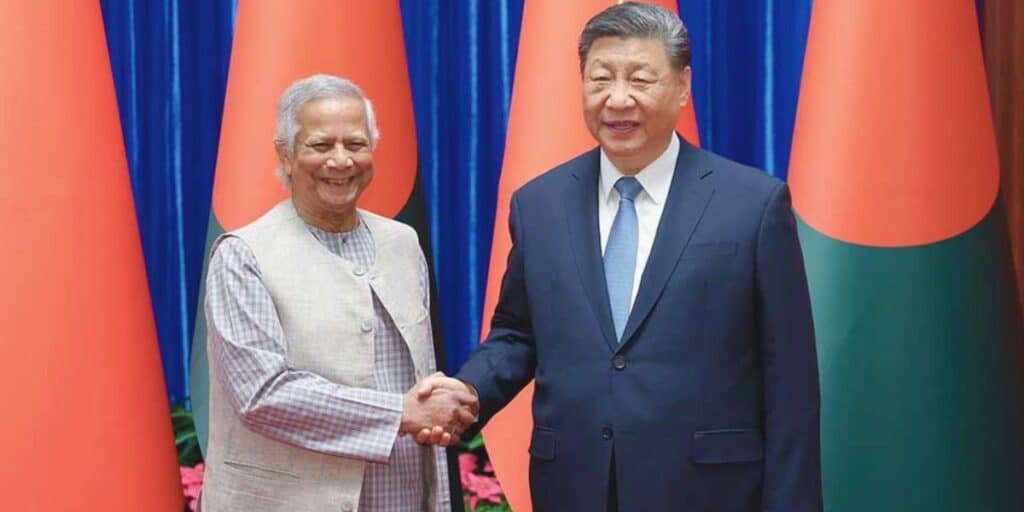WEBDESK: Bangladesh’s Foreign Policy is undergoing a significant shift as the country moves closer to China while its long-standing ties with India grow increasingly strained, reports AFP.
Following the ouster of former Prime Minister Sheikh Hasina, Dhaka’s diplomatic posture has changed, with China emerging as a key partner through financial support and political engagement. Meanwhile, India’s influence appears to be waning, as public sentiment in Bangladesh turns critical of New Delhi’s role in sheltering Hasina and imposing trade restrictions.
This realignment marks a pivotal moment in regional geopolitics, highlighting a broader transformation in Bangladesh’s foreign policy priorities.
The protests that led to the fall of Bangladesh’s previous government last year have reshaped the country’s foreign relations, especially with China gaining favour while long-time ally India has grown distant after Sheikh Hasina was removed from power, AFP reports.
As the anniversary of the unrest approaches, this change in foreign ties is adding to the country’s already fragile political landscape, with rising fears of foreign meddling.
With elections set for next year, the transitional government is trying to build support at home for reforms to strengthen democracy in the nation of 170 million people.
“India-Bangladesh relations have probably never experienced such intense strain before,” said Praveen Donthi of the International Crisis Group, based in New Delhi.
Much of the anger felt by Bangladeshis over the fate of former prime minister Sheikh Hasina is now aimed at India, where she took refuge after escaping a massive student-led protest in August 2024.
Hasina fled by helicopter as demonstrators entered her palace, later arriving in New Delhi.
Interim Prime Minister Muhammad Yunus said public outrage has “transferred over to India” because New Delhi, led by a Hindu nationalist government, offered protection to Hasina.
The 77-year-old has refused to return to face trial for crimes against humanity, and has already been sentenced in absentia to six months in jail for contempt of court.
Bangladesh’s foreign policy: Readjustment
Bangladesh’s Foreign Minister Md Touhid Hossain said ties with India are now undergoing a “readjustment”. Yunus made his first official visit as interim leader to China in March, where he secured $2.1 billion in financial support through investment, loans and grants.
China has also reached out directly to key Bangladeshi politicians. Mirza Fakhrul Islam Alamgir of the Bangladesh Nationalist Party (BNP), the main opposition party, said Beijing is “keen” to work with the next government with “sincerity, steadfastness, love, and affection”.
India has long kept a close watch on China’s increasing role in South Asia, and though diplomatic talks between the two giants have improved recently, rivalry remains strong.
At the same time, Bangladesh is also growing closer to Pakistan.
In May, deadly conflict broke out between Indian and Pakistani forces, with over 70 deaths in just four days following a militant attack in Indian Illegally Occupied Jammu and Kashmir (IIOJK), where India blamed Pakistan without any proof or proper investigation.
The following month, officials from Bangladesh and Pakistan met Chinese counterparts to discuss joint efforts in trade, education, agriculture, and industry.
China’s foreign ministry said the three nations had agreed to move forward with cooperative programmes.
According to Dr Obaidul Haque, an international relations expert from the University of Dhaka, the talks with China have had practical benefits, especially in healthcare. “For example, China designated three hospitals for Bangladeshi patients when India made access difficult,” he said, referring to medical travel restrictions.
Bangladesh and Pakistan, which split after a bloody war in 1971, launched direct sea trade last year and are now planning direct flights, developments that have raised concerns in India.
Donthi pointed out that the current Indian leadership sees the Bangladeshi government as being too Islamist and unfriendly, which explains their cool response. “The visible engagement between Dhaka, Islamabad, and Beijing enhances this perception further,” he said.
Trade tensions are also rising. India has placed new curbs on Bangladeshi goods such as jute, garments, plastic, and food items. Bangladesh has responded with its own restrictions. Still, trade volumes remain strong, according to Md Humayun Kabir, a former ambassador to Washington and India.
He advised Dhaka to proceed with caution when forming international alliances and to maintain balanced relations with multiple partners. “Cooperation still exists between the countries, but the warmth is gone,” he said.
Bangladesh, the world’s second-biggest exporter of garments, has also felt the impact of global shifts, including US tariffs imposed by President Donald Trump. In response, Dhaka has proposed buying Boeing planes and increasing imports of American goods like wheat, cotton and oil.
In June, Yunus told US Secretary of State Marco Rubio that he was committed to stronger ties with Washington.
Despite the shifting alliances, analysts believe tensions in South Asia are unlikely to ease in the near future.
“Things might change only if New Delhi is satisfied with the electoral process and sees somebody amenable to it come to power in Dhaka,” Donthi said.
“But for now, it’s very unlikely their position will shift toward the current government. There may be attempts to undermine it rather than to collaborate.”
Read more: Pakistan warns UN of cross-border terror threat from Afghanistan






